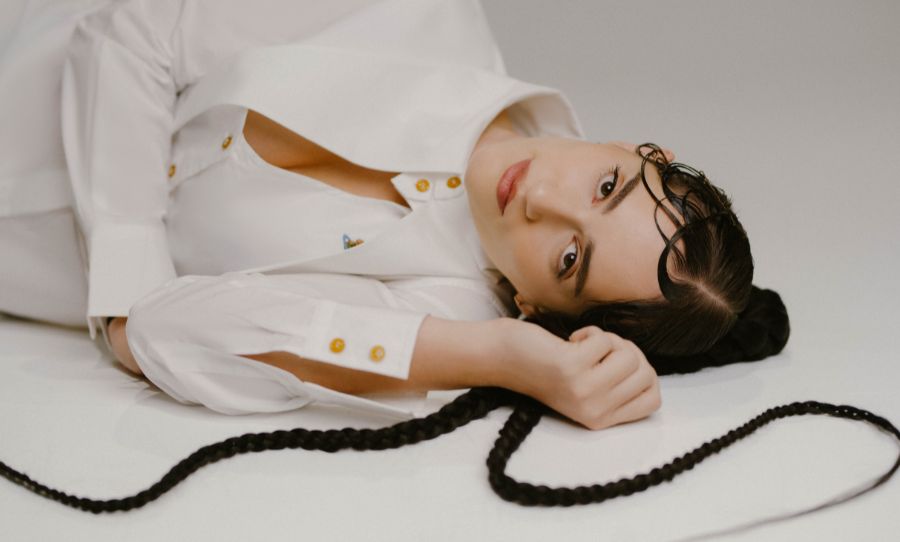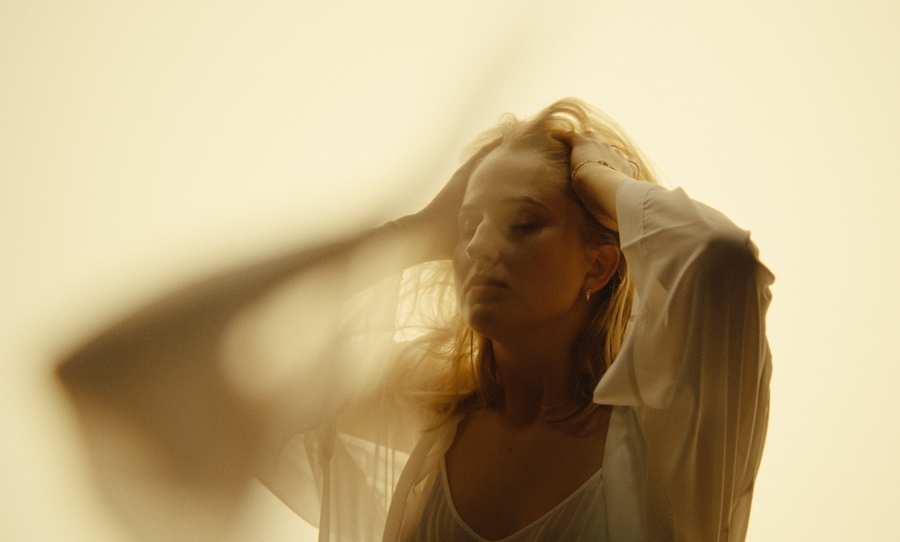“Nothing good can come from war. I hope every viewer questions the world we are a part of, and sees the pressing need for change”
Melbourne-based singer, poet, and director, Kynthia, is not here to make you comfortable and she is not afraid to shake things up.
Her debut project, Collateral Damage, started as a poem, turned into a song, and then blossomed into an animated short that’s already picking up international awards and challenging the status quo.

Co-directed with Faith Teo and produced by Ben Pergolizzi, the film explores the devastating effects of war through the eyes of a child, focusing on the conflict in Gaza.
I’s powerful, heart-wrenching, and a stark reminder that awareness is only part of the equation. That’s why all proceeds from the project are going to Save the Children.
We sat down with Kynthia to chat about how she’s using her voice – and her art – to spark change, how she’s navigating the chaos of creative expression, and why she’s swapped law school for a life behind the mic.
HAPPY: What are you up to today?
KYNTHIA: Today is my day off work so it’ll be quite a full-on day for me!
I have a psychologist appointment, boxing, a meeting for music and then a lot of content to create and edit for social media.
If I have time I’ll also do some music production.
HAPPY: Tell us a little bit about where you live, what do you love about it?
KYNTHIA: I live in Melbourne. Having travelled across the world and experiencing so many cultures and busy cities, I love that Melbourne always feels so relaxed and easy to live in.
It has ample opportunities, plenty of nature and good food. I grew up in Brunswick, which was a very multicultural hub and very community driven.
HAPPY: Collateral Damage started as a poem and song. At what point did you think, “This needs to be an animation”?
KYNTHIA: As Collateral Damage is my first ever release, I felt it needed to have a visual. But as the release date drew closer, it became hard to determine a visual that would give the song both social justice and creative justice.
I just didn’t feel that it was appropriate for me to be in the song, as it wasn’t speaking on my direct experience.
I was feeling the pain of someone else, seas and oceans away from me, and imagining what that must feel like from what I’d witnessed on social media.
I decided a few months after its release to pursue the idea of an animation because I could express the sentiment of the film best.
Faith, the producer and co-director, was a great help in bringing this vision to life, and has now become my close friend.
I think being able to tell the story from a child’s perspective—both from outside the TV (the rest of the world) and inside the TV (the victims) – was able to holistically capture how war has a widespread impact.
HAPPY: You’ve won a stack of awards for this film – what’s been the most surreal moment so far?
KYNTHIA: Probably winning the Lift-Off Global Network Season Award.
I flew all the way to London, landed the morning of the event, rushed around to get my hair and makeup done and straight to the event, not even expecting to win.
It was held at the prestigious Pinewood Studios, where so many great films have premiered, and next to the warehouse where James Bond was filmed.
Winning the award, receiving the recognition, being able to give a speech in front of other very creative and talented people, and then being approached by so many wonderful individuals to tell me how the film impacted them, was beautiful.
It’s more than I could’ve imagined, and I hope the film continues to reach people all over the world.
HAPPY: Your work dives deep into war, loss, and trauma. How do you handle carrying those emotions through your art?
KYNTHIA: My work is very emotional for me. I have cried writing my poetry, recording in the studio and on film sets countless times as I pour my emotion into my work.
It brings me back to the pain I felt, but it also helps me release a lot of it. It gives me a sense of closure that all of these thoughts and emotions and traumas are now held within a song that will always fully understand me.
My music, poetry, and film become an avenue for others to connect with and feel understood in a shared experience.
It brings hope that we are not alone, and that we can all cry the same tears together, as if I am offering a hug to the world. Importantly, we can all heal together, too.
With every project, I work to collaborate with organisations, raise money and awareness, and feature other amazing, strong women and their stories.
It feels special to have such an impact, and I can’t wait to see the full potential my music can truly bring to the world.
View this post on Instagram
HAPPY: Collateral Damage is a gut punch of a film. What do you want people to feel when the credits roll?
KYNTHIA: Regardless of your political views, I think everyone can agree that no child should ever be subjected to, or a victim of, war.
To watch the atrocities of war, which are hard enough to stomach when happening to adults, from the perspective of a child, is truly heart-breaking.
It is to send a message of how the world continues, after all the lessons it has “learnt” from history, to wage destruction, death, and the most horrific war-crimes over politics and resources.
We see the victims become perpetrators with no mercy, no empathy, and no heart. We see the world scream out and it falling to deaf ears of those in power.
We see propaganda reducing human beings to a status less than animals, just because the place they were born in, the colour of their skin, the religion they believe in, their ethnicity or culture, is different.
And to put all of this prejudice onto a child is both beyond moral sensibility and consciousness.
The film ends with the death of the child in the TV, witnessed by the helpless child on the other side of the screen. All that is left behind is the charred bear of what once represented his innocence.
Nothing good can come from war. I hope every viewer questions the world we are a part of, and sees the pressing need for change.
HAPPY: Your proceeds go straight to Save the Children—was it always the plan to make this project a force for action, not just awareness?
KYNTHIA: It has always been my intention to have the biggest impact possible through all of my projects. To put it into context, I was in Law School to be a Human Rights Lawyer for the UN before deciding to pursue music instead, so my plan was always to help people through my art.
Alongside the release of Collateral Damage, I manufactured t-shirts which I sold to mostly family and friends and raised $5000.
It was so good to see how receptive and supportive people were to contributing to the project.
I chose Save the Children as the charity to donate to because their primary focus is children, just like the project.
It’s no longer about awareness; the whole world is protesting and up in arms.
The people are aware, but what change does this bring? The animation serves as a piece of art that allows people to channel emotions about the tragedy they’ve witnessed.
HAPPY: Animation, music, poetry—you blend it all. Is that mix intentional, or do you just follow the creative chaos wherever it leads?
KYNTHIA: This question made me laugh! Creative chaos sounds about right!
When I write a poem, I feel as though I need to bring it to life with production and melodies, and so I create music that captures the emotions I’m trying to convey through the poem.
It’s a very specific and intentional process because I already envision the emotions I intend to evoke in my head. Same as the film process, for a lot of my music I have a very strong visual in my mind, especially because most of it is very cinematic.
Sometimes I write songs inspired by particular movie scenes and then create my own visuals based on their newfound meaning to me.
Creativity with music for me is endless; I wish only to translate all my imagination and thoughts into the tangible.
HAPPY: What’s been the toughest part of this journey – was there a moment where you nearly scrapped it all?
KYNTHIA: As an independent artist, the toughest part is trusting people to work with. Many people in the industry are just there to take advantage of your dreams, hype you up a bit and then take all your money.
A lot of over-promising and under-delivering. It has been very disheartening considering how vulnerable I am in my music and that my intention is only to help people and create change for the world.
It has definitely overwhelmed me and made me think twice about the industry I am trying to enter.
That said, I think I’ve learnt pretty quickly that women have a deeper understanding and passion for my music.
I’m grateful to have already met a lot of strong, amazing women in the industry who are so supportive and who help me carry my creativity into film and beyond.
HAPPY: You’re Greek-Australian—does your cultural background feed into your creative style in ways you don’t even realize?
KYNTHIA: I come from a culture that speaks up against injustice through literature, music, and the people.
I grew up watching my mum perform freedom songs at community concerts – songs the entire nation treasures.
They are peaceful and deeply politically meaningful. They unite and hold centuries of generational pain.
I am proud to come from such a strong, outspoken heritage.
HAPPY: You’ve made your mark in animation—what’s next? More film, more music, something completely unexpected?
KYNTHIA: Much more music and film on the way—but sadly no more animation (for now).
I have my next project, It Was You, being released on April 25th, aligned with it being Sexual Assault Awareness Month. Excited to share this with you!
HAPPY: Lastly, what makes you happy?
KYNTHIA: Meeting new people and travelling.
I love immersing myself in different cultures, histories, and architecture.
People are so diverse and kind all around the world.
Music helps me connect with other creatives too and opens a whole world of possibility.



